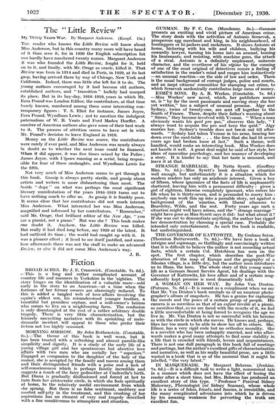The " Little Review "
My Thirty Years War. By Margaret Anderson. (Knopf. Its.) THE reader who knows the Little Review will know about Miss Anderson, but in this country many more will have heard of it than seen it, for in 1920 the English subscription list can hardly have numbered twenty names. Margaret Anderson it was who founded the Little Review, fought for it, held on to it, and finally, with Mr. Orage as oracle, killed it. That Review was born in 1914 and died in Paris, in 1929, at its last gasp, having arrived there by way of Chicago, New York and California. Indeed, there was little else left for it to do. The young authors encouraged by it had become old authors, established authors, and " transition " bulkily had usurped its place. But in its hey-day, 1916-1919, years in which Mr. Ezra Pound was London Editor, the contributors, at that time barely known, numbered among them some interesting con- temporary figures : T. S. Eliot for instance, James Joyce, Ezra Pound, Wyndham Lewis ; not to mention the indulgent paternalism of W. B. Yeats and Ford Madox Hueffer. A number of American authors also gave some of their best work to it. The process of attrition seems to have set in with Mr. Pound's decision to leave England in 1919.
Money on the Little Review was scarce, the contributors were rarely if ever paid, and Miss Anderson was nearly always in doubt as to whether the next issue could be financed. When it did appear, it was five times seized by the Police ; James Joyce, with Ulysses running as a serial, being respon- sible for four of these onslaughts, and Wyndham Lewis for the fifth.
Not very much of Miss Anderson seems to get through in this book. Gossip is always pretty sterile, and gossip about artists and writers is more disheartening than most. The inside " dope " on what was perhaps the most significant literary manifestation of the years 1916-1919 turns out to have nothing much to offer us. As gossip it is frankly poor. It seems clear that her contributors did not much interest Miss Anderson. What interested her was Miss Anderson, magnified and informed by her contributors. " Remember," said Mr. Orage, that brilliant editor of the New Age, "you are a pianist, not a piano." But was she ? This book makes one doubt it. Anyhow, the Little Review was killed. But really it had died long before, say 1920 at the latest. It bad outlived its time ; the world had caught up with it. It was a pioneer effort ; it lived to see itself justified, and some- how afterwards there was not the stuff to make an advanced Review, or else it did not come Miss Anderson's way.
J. R.


































 Previous page
Previous page